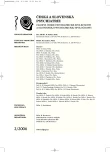-
Medical journals
- Career
Sleep and Attention-Deficit/Hyperactivity Disorder Overview of Present-Day Information
Authors: I. Příhodová; S. Nevšímalová
Authors‘ workplace: Neurologická klinika 1. LF UK a VFN, Praha přednosta prof. MUDr. S. Nevšímalová, DrSc.
Published in: Čes. a slov. Psychiat., 102, 2006, No. 2, pp. 80-84.
Category: Comprehensive Reports
Overview
Attention-deficit/hyperactivity disorder (ADHD) is the most frequent psychiatric condition of childhood. Sleep disorders occur in up to 60% of ADHD children. Frequently reported problems with falling asleep, recurrent nocturnal awakening or changes in total sleep time, as yet to be objectively corroborated, may be behaviour-based. Polysomnography shows increased motor activity in nighttime, more frequent parasomnias (nocturnal enuresis, nightmares, somniloquy) and, in a half of studies, reduced rapid eye movements (REM) sleep. ADHD children were found to have increased daytime sleepiness compensated by hyperactive behaviour. Refering to an increased occurrence of the periodic limb movement and restless legs syndrome, some studies see dopaminergic deficiency as the common cause. While, according to parental reports, there is little doubt about an increased rate of sleep-disordered breathing, there is no unambiguous objective proof of this either. Sleep disorders are a frequent concomitant condition in children with ADHD. Treating them greatly alleviates ADHD manifestations and reduces consumption of stimulants. In some cases, ADHD symptoms may be directly conditional upon a primary sleep disorder.
Key words:
attention-deficit/hyperactivity disorder, sleep-disordered breathing, restless legs syndrome, periodic limb movements in sleep, nocturnal polysomnography.
Labels
Addictology Paediatric psychiatry Psychiatry
Article was published inCzech and Slovak Psychiatry

2006 Issue 2-
All articles in this issue
- Relation between Body Weight-Height and Menstruation in Patients with Anorexia Nervosa
- Hippocampal Volume Assessment in Schizophrenia – Experience from the Department of Psychiatry in Brno
- Sleep and Attention-Deficit/Hyperactivity Disorder Overview of Present-Day Information
- Pharmacological Influence on Glutamatergic System in Schizophrenia
- The Wellness Program - the Glance Back to the First Year
- Czech and Slovak Psychiatry
- Journal archive
- Current issue
- Online only
- About the journal
Most read in this issue- Sleep and Attention-Deficit/Hyperactivity Disorder Overview of Present-Day Information
- Relation between Body Weight-Height and Menstruation in Patients with Anorexia Nervosa
- Pharmacological Influence on Glutamatergic System in Schizophrenia
- The Wellness Program - the Glance Back to the First Year
Login#ADS_BOTTOM_SCRIPTS#Forgotten passwordEnter the email address that you registered with. We will send you instructions on how to set a new password.
- Career

